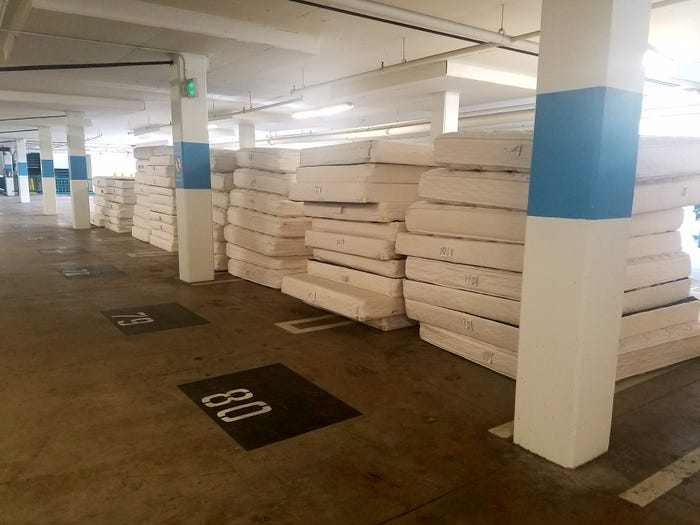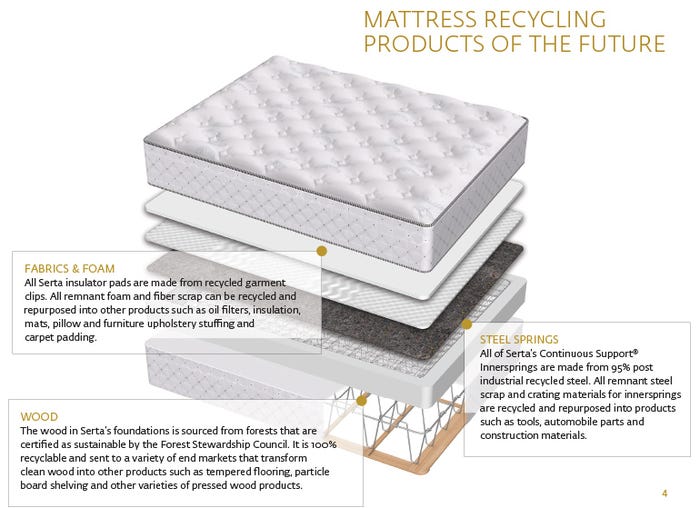Hilton has partnered with Global Sustainable Solutions to launch its Mattress Recycling Initiative and ORCA, a subsidiary of Totally Green Inc., to add food waste disposal systems to a number of its hotels.

One of the biggest challenges for the hospitality sector is reducing waste. In addition to regular waste, restaurants, hotels and other hospitality segments have food waste, packaging waste, used mattresses, bottles and cans, textile waste and other special waste to dispose of.
To help reduce the amount of waste sent to landfill, companies like Hilton Hotels & Resorts—a global brand of full-service hotels and resorts—are developing partnerships and creating sustainable and effective initiatives.
Recently, Hilton partnered with Global Sustainable Solutions (GSS) to launch its Mattress Recycling Initiative, which complies with California Law SB 254 and ensures that the brand’s mattresses and box springs are recycled and not sold to a refurbisher to be re-covered and sold again. The law, which went into effect on September 30, 2015, requires that mattress manufacturers create a statewide recycling program for any mattress and box spring that is discarded in the state. In California, the statewide recycling program is funded through a recycling fee that’s collected through each mattress and box spring sold. The States of Connecticut and Rhode Island also have mattress recycling laws in place.

“Hilton takes global sustainability seriously, and our partnership with GSS, a women-owned business, supports our sustainability goals and objectives and our commitment to supplier diversity. In addition to diverting mattresses and box springs from landfill, we work with GSS and LG Electronics to recycle televisions,” says Judy Pines, director of sustainability and responsible sourcing supply management for Hilton Hotels & Resorts. “Since launching the Mattress Recycling Initiative, we have seen a 50 percent cost savings on average, and we expect to see that number grow in the future as we expand the initiative to other regions.”
While the initiative is open to all U.S.- and Canada-based Hilton hotels, Hilton Anaheim, Calif., recently set the bar high by removing, deconstructing and recycling approximately 2,589 used Serta Perfect Sleeper Mattresses (306,894 pounds of solid waste) between January 4 and February 25.
“Hilton Anaheim is the largest mattress recycling product we have done to date. In the past two months or so, we have also diverted a total of approximately 4,000 mattress and box spring pieces from a number of hotels in the States of North Carolina, New York, Virginia, Pennsylvania and Tennessee,” says Pines. “Approximately 95 percent of the mattress and box spring components that were removed from the hotels will be recycled and repurposed into new products, such as tools, tempered flooring, oil filters and carpet padding.”

In addition to diverting mattresses and box springs from landfill, Hilton is working to reduce food waste, water consumption, e-waste and energy consumption in its hotels across the globe. For food waste reduction, Hilton has partnered with ORCA, a subsidiary of Totally Green Inc., to add food waste disposal systems to a number of its hotels. The food waste disposal systems dispose of food waste onsite and convert the organic waste into environmentally safe water, which ultimately eliminates disposal costs and improves the health and safety of employees.
“Millennium Hilton in New York is one of our locations that utilize a food digester. With the digester, the hotel diverts about 7 tons of hotel restaurant organic waste from landfill per month, which results in a cost savings of approximately 18 percent per month. It also enables the hotel to comply with the NYC Commercial Organics Law that mandates hotels with greater than or equal to 150 sleeping rooms and a restaurant to recycle their organic waste,” comments Pines.
For water consumption reduction, Hilton uses low-temp laundry technologies and products in its hotels, which helps reduce water consumption by up to 45 percent, energy consumption by up to 50 percent and linen replacement by up to 80 percent.
“According to the Environmental Protection Agency, the hospitality sector is responsible for 19 percent of water usage and landscaping, which is the second largest use of water in hotels, accounts for 16 percent of a property’s budget,” says Pines. “As part of our commitment to reduce water consumption, we have also implemented a sustainable landscaping solution that helps us minimize air and noise pollution, the use of mowing equipment and toxic chemicals and overall water consumption.”
To help keep track of each hotel’s sustainability efforts, Hilton uses a proprietary corporate responsibility measurement platform called LightStay, which analyzes and reports environmental, social and operational performance. Each year, every Hilton hotel is required to track one water, one waste and one energy reduction project, which helps hotels see how they score compared to other hotels.
Over the past six years, LightStay has helped Hilton reduce energy usage by 14.5 percent, carbon output by 20.9 percent, waste output by 27.6 percent and water usage by 14.1 percent, which totals an estimated $550 million in accumulative savings.
“As we move forward into 2017 and the years to come, we plan on creating additional partnerships and programs to help us become even more sustainable,” says Pines. “We are committed to reducing the amount of waste generated at all of our properties, and we will continue to focus on that commitment in the future.”
About the Author(s)
You May Also Like




